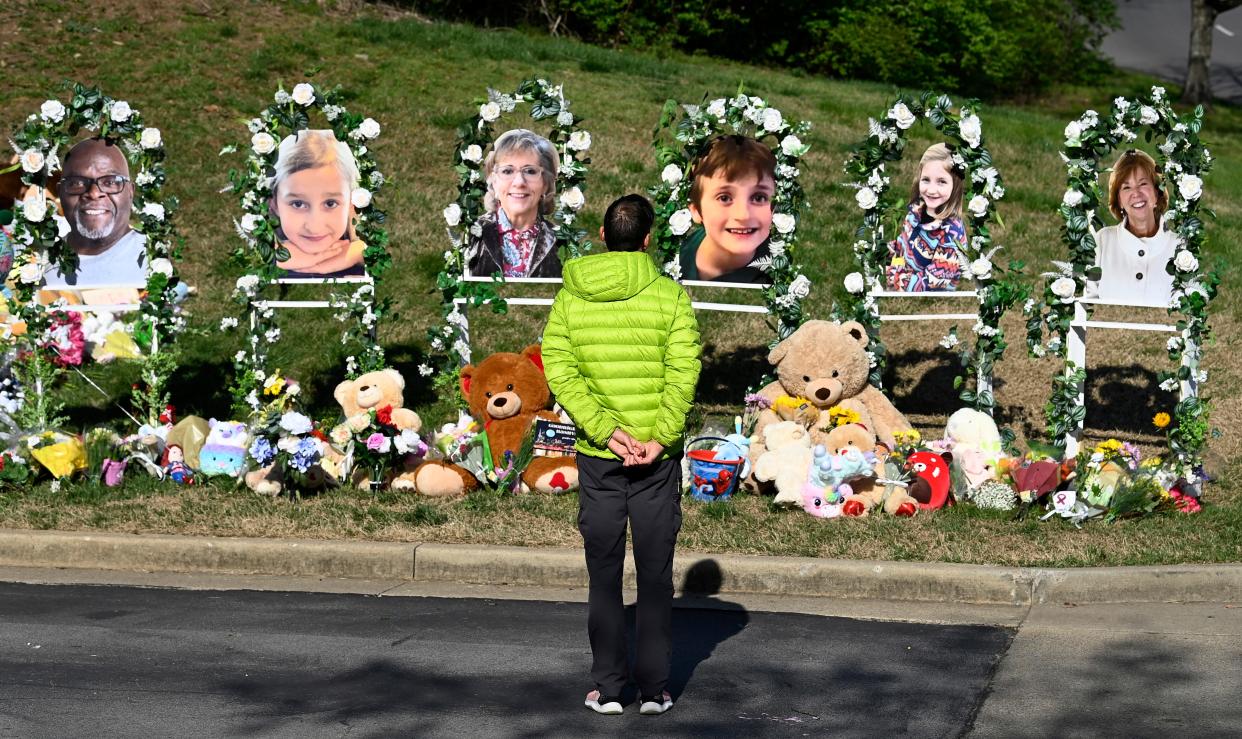Why the Nashville Covenant shooter's notebooks haven't been publicly released

After three pages purported to be from the Covenant School shooter's notebooks were leaked online, renewed calls to release the documents in their entirety exploded on social media.
Many parents of Covenant School students have been and continue to be ardently opposed to the release of any information from the notebooks.
"We knew these writings, these thoughts from the shooter were heinous … the damage done today is already significant, and I'm worried it's only going to grow," Brent Leatherwood, a Covenant parent, said hours after the unauthorized release Monday.
Mayor Freddie O'Connell swiftly called for an investigation into the leak.
Metro Nashville police said the pages were not from their collection of evidence photographs, then later placed seven officers on administrative assignment with full police power while the investigation continues.
The city, and, by extension, the Metro Nashville Police Department, cannot release the notebooks because of pending lawsuits.
Here's why the documents have not been released:
Requests for Covenant documents denied, lawsuit filed
When police and Tennessee Bureau of Investigation agents responded to the school in March, the notebooks were found in the shooter's car, according to a statement from Metro's Department of Law.
"Those became part of the criminal investigative file," the statement said. "Pursuant to Rule 16 of the Tennessee Rules of Criminal Procedure, records in a criminal investigative file are not subject to disclosure under the Tennessee Public Records Act until the investigation and any related criminal case is complete."
Tennessean reporters, among other media outlets, requested those records within days of the shooting, but those requests were denied.
The Tennessean has no plans to publish the writings verbatim and has sought to center coverage on public policy, the victims and the community.
Police provided a copy of the journals to Metro Legal to review what could be released in accordance with state public records laws, the statement said.
"Before that process was completed, multiple parties, including news media and Second Amendment activist groups, filed suit in the Chancery Court of Davidson County to compel production of the journals and other items in the investigative file," the statement said.
Covenant documents filed under seal with courts
The cases filed for the records were consolidated into one lawsuit, and Metro Legal asked that parents of Covenant students be allowed time to hire legal counsel and intervene in the case.
In the meantime, Metro Legal filed an unredacted copy of the notebooks and a redacted copy for compliance under public records laws in May, the statement said. Those records were filed under seal for the judge to review.
"MNPD approved this limited release because they wanted to answer some of the questions being raised about the crime and thought that releasing this redacted version would not harm the ongoing investigation," the statement said.
Those records remain under seal.
Metro Legal has not shared the documents with any other attorneys, the mayor, council members or anyone else, the statement said.
What was redacted from the Covenant notebooks
Under public records laws, documents related to school safety are exempt from disclosure. Parents intervening in the lawsuit argue the release of the notebooks will infringe on school safety.
Metro Legal redacted portions of the journals "relating to specific planning of the attack on this school," according to their statement.
"We did not redact various issues and what could be considered expressions of the motivation for carrying out this horrific crime," the statement said.
Where the Covenant documents lawsuit stands
Chancellor I’Ashea Myles granted the parents the right to intervene in the case in May. The groups suing for the records subsequently appealed that decision to the Tennessee Court of Appeals, putting the case on hold.
Attorneys for both sides argued their cases in front of the appeals court in mid-October. The three judges — Kristi Davis, John McClarty and Thomas Frierson — did not say when they'd make a ruling in the case.
Once the decision is made, either party can appeal the intervention to the Tennessee Supreme Court, or it'll go back to Davidson County Chancery Court.
"Until this matter is resolved by the courts, Metropolitan Nashville is prohibited from releasing the journals," the statement said. "The journals are filed under seal with the Chancery Court and may not be released by MNPD, Metro Legal, or any other local authority."
This article originally appeared on Nashville Tennessean: Nashville Covenant shooting: Lawsuits keep shooter's notebooks sealed

